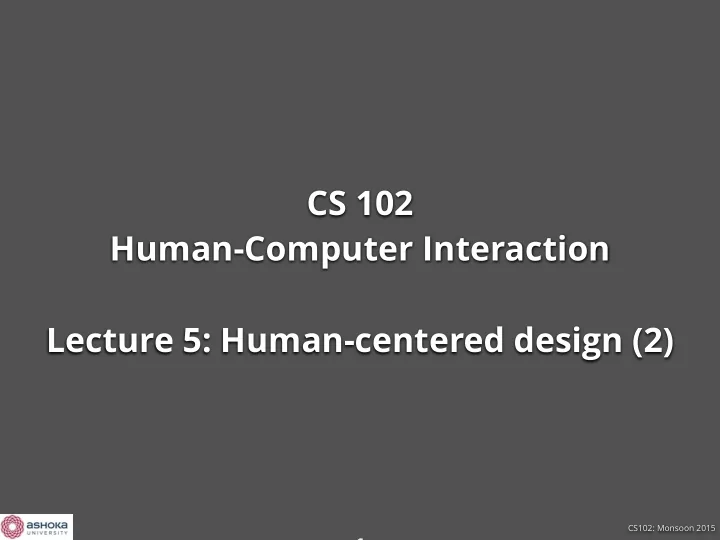

CS 102 Human-Computer Interaction Lecture 5: Human-centered design (2) CS102: Monsoon 2015 1
Administrative Project team formation and outlines due today (talk to us after class if you need help) Studio class next week O ffi ce hours interchanged this week: Prof. Hangal: Tuesday 3-4 pm (Room 604) Abhilasha Kumar: Friday 10-11am (Room 601) CS102: Monsoon 2015 2
Recap CS102: Monsoon 2015 3
IRB requirements Please complete this training: https://phrp.nihtraining.com (apologies: it is U.S. centric) Email cs102-sta ff your certi fi cates by next Monday (Sep. 21) CS102: Monsoon 2015 4
Some IRB issues for CS Informed Consent Data protection and privacy Play it safe, ask IRB if in doubt (irb@ashoka.edu.in) CS102: Monsoon 2015 5
Data protection and privacy Avoid getting or storing passwords/personal data if you can Encrypt data (stored, or in transit) and fi le system where possible Anonymize at the earliest Keep data on secure systems (not laptops) Clean up log fi les Beware of implicitly recorded data (e.g., location, IP addresses, time stamps) Researchers should know/keep as little as necessary CS102: Monsoon 2015 6
Understanding users Studying and understanding users is one of the most important things HCI designers do Many speci fi c techniques: Surveys Observation Probes Diary/pager studies Interviews Contextual enquiry Ethnographic methods … CS102: Monsoon 2015 7
Ethnography Ethnography is a general method (contrast: anthropology is a discipline) Ethnographic studies are often used by product designers to better understand their users CS102: Monsoon 2015 8
Qiblah phone (LG-F7100) Embedded compass Mecca direction Prayer time alarm (Azan) CS102: Monsoon 2015 9
Ethnography Classic ethnographic study of a village near Mysore in 1948 CS102: Monsoon 2015 10
Interviews 11 CS102: Monsoon 2015
Interviewing skills Ability to conduct good interviews is an invaluable skill Practice interviewing skills: Never miss a chance to talk to anyone from a di ff erent background A good interviewer is: empathetic, supportive, observant, open-ended CS102: Monsoon 2015 12
Example https://www.youtube.com/watch?v=QiLzTA0OR60 CS102: Monsoon 2015 13
Interviewing tips Ask open-ended questions, e.g. “Do you use whatsapp?” vs. “What apps do you use?” Closed-ended questions are easy to answer, but open- ended questions give more information You can start with closed-ended questions to put the subject at ease, then ask open-ended questions CS102: Monsoon 2015 14
Interviewing tips Observe/clarify terminology (re fl ects mental model) e.g. “I click on the snow fl ake icon” vs. “I click on the white thingy”. “I use the dial” vs. “I use the wheel”. Paraphrase and summarize “Ok, so you don’t use this feature because…” CS102: Monsoon 2015 15
Interviewing tips Don’t ask a leading question, i.e. question that suggests the answer by wording or tone “I’m sure you’ll fi nd this interesting…” Indicate understanding rather than agreement “This company’s products suck…” Keep the focus on the interviewee You’re trying to imagine what it’s like to be in their place CS102: Monsoon 2015 16
Interviewing tips Ask (series of) why? questions While backing up, look for other things that may follow from the situation Avoid narrow framing CS102: Monsoon 2015 17
Interviewing tips Many times, interviewees may not understand their own actions completely Look for concrete stories rather than vague generalizations Subject: “Typically, I…” Interviewer: “Is that what happened last time you did this?” Understand the generalization process CS102: Monsoon 2015 18
Interviewing tips (If in a formal setting) Introduce yourself and explain your purpose. Summarize your discussion Be aware of your biases Take notes, organize them soon after the interview CS102: Monsoon 2015 19
Interviewing tips Silence is ok Be attentive Open up a bit yourself Use common sense: be personable, smile, don’t be condescending You’ll know when you’re successful CS102: Monsoon 2015 20
In-class exercise CS102: Monsoon 2015 21
Contextual Enquiry 22 CS102: Monsoon 2015
Contextual enquiry Users often have trouble articulating exactly how they do things “Take a grand tour” in their natural environment to tap into tacit knowledge Get participants to perform their regular tasks Try and understand their conceptual model CS102: Monsoon 2015 23 Don’t ask your customer by Karen Holtzblatt
Contextual enquiry: tips Adopt a master - apprentice model Look out for errors Avoid leading the user Prepare a brie fi ng and documentation medium CS102: Monsoon 2015 24
Contextual enquiry: analysis Physical analysis: Physical layout of environment Artifact analysis: Props used Flow analysis: Flow between di ff erent people Sequence analysis: Order of tasks Cultural analysis: Local norms CS102: Monsoon 2015 25
Tom Kelley CS102: Monsoon 2015 26 https://www.youtube.com/watch?v=tvkivmyKgEA
Recommend
More recommend